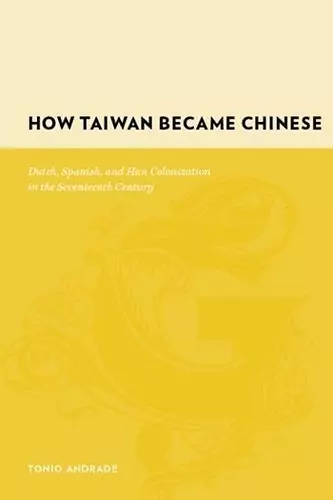How Taiwan Became Chinese
Dutch, Spanish, and Han Colonization in the Seventeenth Century
Format:Hardback
Publisher:Columbia University Press
Published:23rd Dec '08
Currently unavailable, our supplier has not provided us a restock date

Superb... Andrade brilliantly reminds us of how important the brief episode of European occupation was. American Historical Association
Tells how Europeans managed to establish colonies throughout the globe not because of technological superiority but because their states sponsored overseas colonialism whereas Asian states did not. This book shows how European trade, protection, and occupation played a central role in Taiwan's colonization and incorporation by the Chinese empire.At the beginning of the 1600s, Taiwan was a sylvan backwater, sparsely inhabited by headhunters and visited mainly by pirates and fishermen. By the end of the century it was home to more than a hundred thousand Chinese colonists, who grew rice and sugar for export on world markets. This book examines this remarkable transformation. Drawing primarily on Dutch, Spanish, and Chinese sources, it argues that, paradoxically, it was Europeans who started the large scale Chinese colonization of the island: the Spanish, who had a base on northern Taiwan from 1626 to 1642, and, more importantly, the Dutch, who had a colony from 1623 to 1662. The latter enticed people from the coastal province of Fujian to Taiwan with offers of free land, freedom from taxes, and economic subventions, creating a Chinese colony under European rule. Taiwan was thus the site of a colonial conjuncture, a system that the author calls co-colonization. The Dutch relied closely on Chinese colonists for food, entrepreneurship, translation, labor, and administrative help. Chinese colonists relied upon the Dutch for protection from the headhunting aborigines and, sometimes, from other Chinese groups, such as the pirates who ranged the China Seas. In its analysis the book sheds light on one of the most important questions of global history: how do we understand the great colonial movements that have shaped our modern world? By examining Dutch, Spanish, and Han colonization in one island, it offers a compelling answer: Europeans managed to establish colonies throughout the globe not primarily because of technological superiority but because their states sponsored overseas colonialism whereas Asian states, in general, did not. Indeed, when Asian states did, European colonies were vulnerable, and the book ends with the capture of Taiwan by a Chinese army, led by a Chinese warlord named Zheng Chenggong.
Lively and deeply researched. An enjoyable, enlightening, and de-centering read for every student of late imperial China and of early modern empire. -- John E. Wills Jr., University of Southern California (emeritus) Through the prism of a single island's experiences, Andrade develops implications for the early modern world as a whole... [Brings] the complex dynamics of the period into clear focus [and] offers perceptive insights on the nature of European and Asian colonial expansion in early modern times. -- Jerry Bentley Journal of World History A wonderful introduction to the global world in the seventeenth century. The contemporary standoff between the Republic of China cum 'Chinese Taibei' vis-a-vis the People's Republic of China remains a political headache with the potential for causing a global economic downturn. This book is the best account that places the present situation in historical context. -- Benjamin Elman, Princeton University Tonio Andrade accomplishes handsomely three original tasks: he explains how Chinese ethnicity came to dominate Taiwan under non-Chinese leadership; he develops a new theoretical model, that of co-colonization, to explain this transformation; and he demonstrates the relevance of Taiwan's experience to the early modern history of the wider Asian littoral. Throughout, his writing is fast-paced and full of arresting anecdotes. -- Victor Lieberman, University of Michigan A masterpiece. This book should interest not only scholars of Taiwan history but also those who work on European expansion, colonialism, and Chinese history. This first monograph on the early history of Taiwan will doubtless become a standard reference. -- Han Jiabao, author of Helan shidai Taiwan de jingji, tudi, yu shuiwu Andrade deserves high praise for writing an absorbing and entertaining history of an important period in the history of Taiwan. -- David Wilmshurst Journal of the Royal Asiatic Society, Hong Kong Branch How Taiwan Became Chinese provides a vivid study of colonial government on the ground. International Jorunal of Asian Studies provides a model for the study of interdependence, cooperation and conflict between many different actors applicable to many other situations. Journal of Early Modern History A valuable addition to the scholarship on Taiwan and the early modern history of East Asia. -- Madhavi Thampi China Report An important book... the author is to be commended for such a readable and accessible text. -- Paul Van Dyke Journal of Asian Studies Andrade's book is important and should not be overlooked by scholars of Qing history, comparative colonial processes, or world history. -- Laura Hoestler American Historical Review Engaging -- Tara Alberts Journal of Early Modern History This is an important and quite wonderful book. Social History The individual chapters are interestingly presented. Some of the material reads as much like adventure or history. This would be good teaching material...A real contribution to the debate over whether to regard Taiwan as Chinese. The History Teacher
ISBN: 9780231128551
Dimensions: unknown
Weight: unknown
324 pages